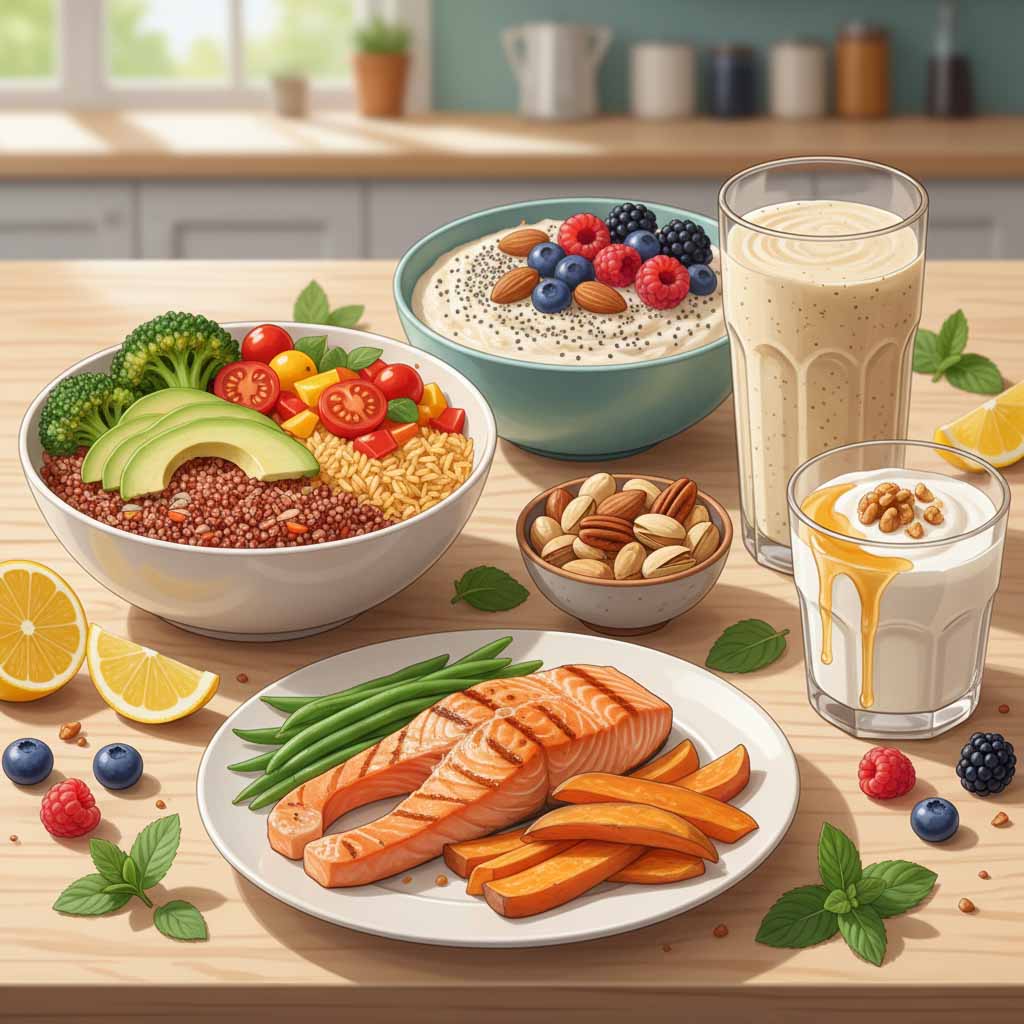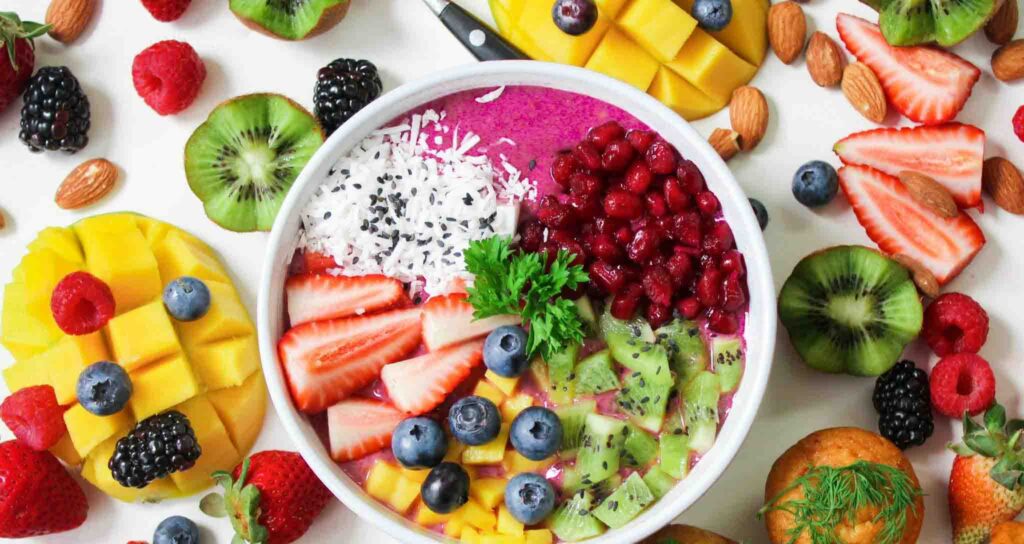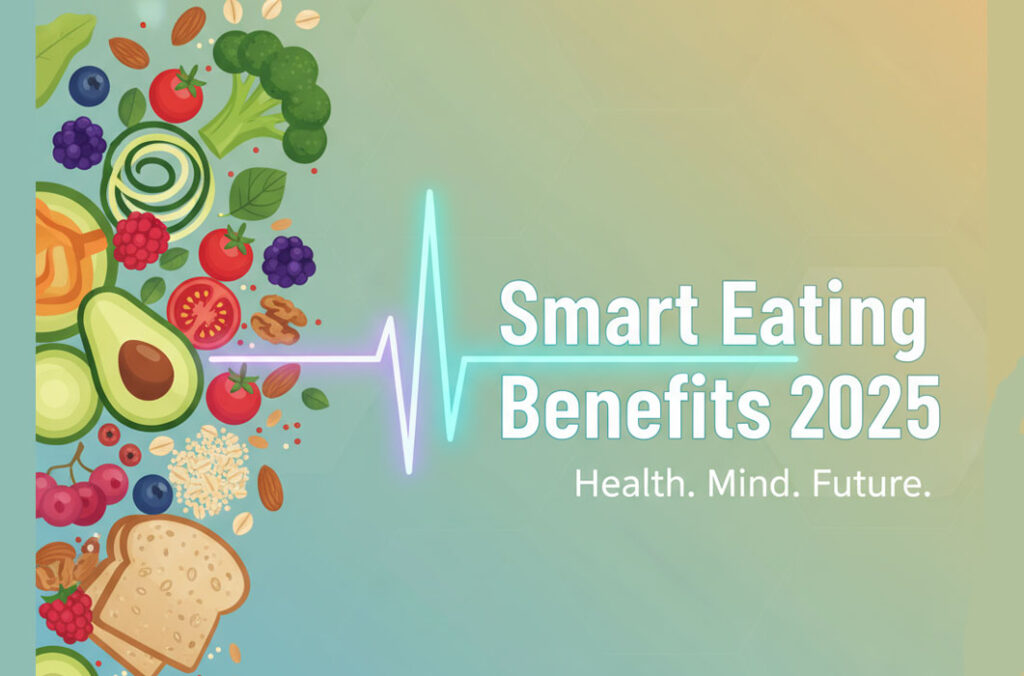Shaam ke 8:30 baj rahe hain, aur supermarket ke checkout line me thake hue chehre nazar aa rahe hain. Koi instant noodles utha raha hai, koi cookies ka packet daal raha hai, aur aage khadi ek lady ready-to-eat meals ke shelf ko ghur rahi hai — soch rahi hai ki “low-fat” option le ya phir woh jo bas taste me accha lag raha hai. Aise moments me khana health se zyada convenience ban jaata hai — aur yahi galti hum me se zyadatar kar dete hain.
Yahin par Smart Eating ka concept aata hai. Simple shabdon me, Smart Eating ka matlab hai food choose karna based on nutrient quality, sahi timing, kitna processed hai, aur aapki personal health needs — na ki sirf calories ginna. Ye ek aisi soch hai jahan food ko body aur mind dono ke liye fuel samjha jaata hai, na ki bas plate bharne ke liye.
Is blog me hum dekhenge ki 2025 me Smart Eating kyon aur bhi zyada important hai, iske science-backed benefits kya hain, aur aap kaise ek simple daily aur weekly routine bana sakte ho jo aapke lifestyle ke saath naturally fit ho. Saath hi aapko milenge 10 quick swaps jisse aap apne meals ko healthier bana sakte ho bina flavor ya time compromise kiye, plus ek dedicated FAQ section jahan hum Smart Eating ke sabse common doubts clear karenge.
Aur end tak aap na sirf is concept ko samjhoge, balki aapke paas practical steps bhi honge jo aap turant apply kar sakte ho — agali baar jab aap checkout line me khade ho.
Smart Eating kya hai?
Apne core me, Smart Eating ek aisi practice hai jisme food choices sirf calorie count se aage badh kar kiye jaate hain. World Health Organization ke hisaab se, healthy eating ka matlab hai variety, nutrient density aur moderation ka balance — aur Smart Eating isi base ko aage lekar chalta hai. Yeh focus karta hai kya khate ho, kab khate ho, aur wo aapke unique lifestyle aur health needs ko kitna suit karta hai.
Yeh koi strict diet nahi hai, balki ek flexible approach hai jo aapke body ko fuel deti hai, energy ko steady rakhti hai, aur long-term health ko protect karti hai.
Smart Eating ke Key Principles
1. Quality over Quantity
Apni plate ko whole foods se bharo — fruits, vegetables, lean proteins aur fiber-rich grains. Yahan nutrient density portion size se zyada important hai. (American Heart Association)
2. Ultra-Processed Foods kam karo
Packaged snacks, sugary drinks aur lambi ingredient list wale meals limit karo. BMJ ke studies ne dikhaya hai ki high ultra-processed food intake ka strong link chronic diseases se hai.
3. Timing aur Consistency ka dhyaan rakho
Body ke natural rhythm ke hisaab se khana lo — jaise din me balanced meals lena aur late-night heavy snacks avoid karna. Isse energy aur metabolism dono better hote hain. (Health.com)
4. Apni Plate ko Personalize karo
Age, activity level aur health goals sab ke liye alag hote hain. 2025 ki nutrition science “need states” par focus karti hai — matlab aapka diet aapke current stage of life aur personal health ke hisaab se adapt hona chahiye.
👉 Bottom line: Smart Eating perfection ke baare me nahi hai. Yeh chhoti-chhoti steady habits banane ke baare me hai jo khane ko simpler, healthier aur sustainable banati hain.
2025 me Smart Eating kyon zaroori hai? 🌍
Aaj hum aise time me jee rahe hain jahan food availability pehle se zyada hai — lekin fir bhi log poor diets ke effects se struggle kar rahe hain. Ultra-processed foods ab worldwide daily calories ka bada hissa ban chuke hain, aur child aur adult dono me obesity rates lagataar badh rahe hain.
UNICEF ke reports kehte hain ki bachche packaged snacks aur sugary drinks par zyada depend ho rahe hain, jabki CDC warn karta hai ki diet-related diseases jaise type 2 diabetes ab younger ages me bhi dikhne lagi hai. BMJ me publish hui research ne bhi dikhaya hai ki high ultra-processed food intake ka strong link heart disease aur premature death se hai.
Short me bole to: convenience-driven food system humari long-term health ko kharab kar raha hai.
Isi wajah se Smart Eating essential ban jaata hai. Agar aap nutrient quality, food processing level aur timing par focus karo, to aap apne aapko aaj ke bade health risks se protect kar sakte ho. Research evidence kehta hai ki Smart Eating ke kuch powerful benefits hote hain:
Smart Eating ke Benefits
1. Better Heart & Metabolic Health
Studies dikhati hain ki adults me improved cholesterol levels, lower blood pressure aur better blood sugar control milta hai jab diet whole foods rich aur processed foods low hoti hai. (PubMed)
2. Lower Long-Term Mortality Risk
Large-scale analyses kehte hain ki jo log ultra-processed food consumption kam karte hain unka early death risk significantly lower hota hai. (PMC)
3. Sharper Mood & Cognition
Fiber- aur polyphenol-rich diet gut microbiome ko feed karti hai, jo mental well-being aur brain function ko support karti hai. (Kerry Health and Nutrition Institute)
4. Longevity aur Healthy Ageing
Nutrients jaise flavonoids, fiber aur well-timed protein intake ab reduced inflammation aur improved ageing markers se linked hain. (Health.com)
👉 Bottom line: Smart Eating fads ke peeche bhaagne ka naam nahi hai. Yeh ek steady aur evidence-based approach hai jo modern risks ke beech aapki health ko protect karti hai.
Top 10 Science-Backed Benefits of Smart Eating ✅
1. Cardiometabolic Risk ko kam karta hai
BMJ me publish research kehti hai ki agar diet whole foods par based ho aur processed foods kam ho, to blood pressure, LDL cholesterol aur type 2 diabetes ka risk significantly reduce hota hai. Yeh heart ko protect karta hai aur circulation ko long run me healthy rakhta hai.
2. Harmful Additives se exposure kam hota hai
Ultra-processed foods me preservatives, emulsifiers aur added sugars hote hain jo inflammation aur chronic illness se linked hain. PMC ke studies dikhate hain ki jo log inhe kam karte hain unhe long-term health complications kam face karni padti hain.
3. Healthy Weight Management support karta hai
CDC kehta hai ki balanced eating patterns jo fiber, protein aur whole grains se rich ho, wo appetite regulate karte hain aur unhealthy weight gain se bachate hain. Crash diets ke opposite, Smart Eating sustainable habits build karta hai jo years tak maintain kiye jaa sakte hain.
4. Gut Health aur Mood improve karta hai
Kerry Health and Nutrition Institute ke according, fiber aur polyphenol-rich foods beneficial gut bacteria ko feed karte hain. Ek healthy gut microbiome digestion ke saath-saath mood stability aur mental clarity ko bhi support karta hai.
5. Energy aur Sleep Quality boost karta hai
Health.com ke reports dikhate hain ki consistent times par balanced meals lena (especially din me earlier meals) daytime energy improve karta hai aur raat me better sleep deta hai. Smart Eating aapke body ko natural rhythm ke saath align karta hai aur fatigue reduce karta hai.
6. Chronic Inflammation ko reduce karta hai
Jab diet colorful vegetables, fruits, nuts aur omega-3 fats par based hoti hai, to inflammatory markers body me naturally kam hote hain. Isse arthritis, cardiovascular disease aur metabolic disorders jaisi conditions se protection milti hai. (PubMed)
7. Nutrient Density badhata hai
Smart Eating vitamins, minerals aur antioxidants ki intake naturally increase karta hai. BMJ ke studies kehte hain ki ye un nutrient gaps ko close karta hai jo packaged food par zyada rely karne wale logon me common hote hain.
8. Metabolic Flexibility build karta hai
Protein, healthy fats aur fiber ke balanced meals body ko train karte hain ki carbs aur fats ke beech smoothly fuel burn kar sake. Isse blood sugar spikes aur crashes kam hote hain. (PMC)
9. Smart Swaps ke through paisa bachata hai
Seasonal produce, legumes aur whole grains ke saath cooking convenience foods se sasti padti hai. CDC kehta hai ki jo families Smart Eating adopt karti hain unhe health ke saath budget me bhi improvement milta hai.
10. Longevity aur Healthy Ageing support karta hai
Flavonoids, fiber aur quality protein jaise nutrients oxidative stress ko kam karte hain aur age-related decline ko slow down karte hain. Smart Eating ek longer aur healthier life ke liye foundation set karta hai. (Health.com)
Principles to Follow — Practical Rules of Smart Eating

Smart Eating perfection ya restriction ke baare me nahi hai; yeh chhoti-chhoti choices ke baare me hai jo milkar bada difference banati hain. Yahan 5 simple rules hain jo aap turant apne meals me apply kar sakte ho:
Rule 1: Plate ka 50–70% hamesha whole foods se bharo
Apni plate ko ek circle samjho. Kam se kam half part colorful vegetables aur fruits ka hona chahiye, baaki lean proteins aur whole grains ke liye jagah rakho. American Heart Association kehta hai ki ultra-processed items plate ka sabse chhota hissa hone chahiye.
Rule 2: Har meal me fiber aur protein ko priority do
Dietary Guidelines ke according, fiber aur protein wo do nutrients hain jinki kami sabse zyada hoti hai. Din ki shuruaat oatmeal plus nuts se karo, ya apne salad me beans add karo — ye combos aapko full rakhte hain aur blood sugar balance karte hain.
Rule 3: Sugary drinks limit karo — paani ya tea choose karo
World Health Organization advise karta hai ki sugar-sweetened beverages cut down karo, kyunki ye hidden calories ka sabse bada source hain. Soda ke jagah sparkling water with lemon choose karo ya fir unsweetened green tea energy boost ke liye.
Rule 4: Teen common ultra-processed foods ko swap karo
Flavored yogurt cups ki jagah plain yogurt with fresh fruit lo. Packaged chips ke jagah roasted chickpeas choose karo. Sugary breakfast cereal ke badle homemade muesli with oats aur seeds try karo. BMJ ke studies kehte hain ki aise small swaps bhi long-term risk reduce karte hain.
Rule 5: Packaged foods ke liye quick label check karo
Agar ingredient list tumhari phone screen se lambi hai, to ye ek red flag hai. Ek simple shortcut: 100 grams me 10 grams se kam sugar aur aise ingredients jo easily pronounce ho sakein. Ye habit shopping ko smarter banati hai bina extra effort ke.
Daily & Weekly Smart Eating Routine 📅
Eating smarter ka matlab har din apni kitchen ko reinvent karna nahi hai. Yeh bas ek aisi routine create karne ke baare me hai jo aap bina stress ke repeat kar sako. Yahan ek simple 7-day micro-plan hai jo aapke mornings, lunches, snacks, dinners aur weekend prep ko guide karega:
Morning: Protein + Fiber se start karo
Health experts kehte hain ki high-protein aur fiber-packed breakfast energy ko stable rakhta hai. Breakfast skip karne ya sugary pastry grab karne ke bajaye try karo:
- Oatmeal with chia seeds, almonds aur berries.
- Scrambled eggs with spinach aur whole-grain toast.
- Smoothie made with unsweetened yogurt, banana aur flaxseed.
Ye meals blood sugar ko steady rakhte hain aur mid-morning crashes prevent karte hain. (Health.com)
Lunch: Build-your-bowl method
Lunch ko ek bowl samjho jisme 4 layers ho — whole grain + vegetables + lean protein + healthy fat. Example:
- Brown rice + roasted broccoli + grilled chicken + avocado slices.
- Quinoa + cucumber & tomato + chickpeas + olive oil drizzle.
Ye flexible “mix-and-match” method balanced meals ko easily build karne me help karta hai bina zyada soch-vichaar ke. (American Heart Association)
Snacks: Simple aur nutrient-rich rakho
Smart Eating snacks light, portable aur satisfying hone chahiye. Options:
- Ek handful unsalted nuts (20–25 almonds).
- Small bowl plain yogurt with 1 tsp honey.
- Ek fresh fruit, jaise apple ya banana.
Ye choices protein, healthy fats aur natural sugars provide karte hain bina packaged snacks ke crash ke. (The Times of India)
Dinner: Earlier aur lighter for better rest
Dinner heavy nahi hona chahiye. Thoda pehle khana aur lighter carbs choose karna helpful hai agar aap late-night glucose spikes sensitive ho. Try karo:
- Grilled salmon with steamed green beans aur small sweet potato.
- Lentil soup with side salad.
- Stir-fried tofu with mixed vegetables aur small portion of brown rice.
Dinner kam se kam 2 hours pehle finish karo taaki better sleep quality mile. (Health.com)
Weekend Batch-Cook & Shopping List
Weekend me 1 hour dedicate karo basics prep ke liye jo week me time save kare:
- Large batch quinoa ya brown rice cook karo.
- Mixed vegetables roast karo (carrots, zucchini, peppers).
- Boiled eggs prepare karo aur fresh greens wash karo.
10-item Smart Shopping List: Oats, quinoa, brown rice, spinach, broccoli, chickpeas, plain yogurt, eggs, nuts, seasonal fruits.
In items ke saath aap dozens of quick aur healthy meals easily mix aur match kar sakte ho bina stress ke.

Common Myths About Smart Eating — Debunked ❌
Smart Eating apne core me simple hai, lekin misinformation aksar basics ko cloud kar deti hai. Chaliye kuch persistent myths ko science-backed clarity ke saath clear karte hain:
Myth 1: “All fats are bad.”
Ye sahi nahi hai — healthy fats (jaise olive oil, nuts aur fatty fish) brain aur heart health ke liye essential hain. (Dietary Guidelines for Americans)
Myth 2: “You must avoid carbs.”
Problem carbs me nahi, refined carbs me hai. Whole-grain carbs with fiber digestion aur long-term energy ke liye beneficial hain. (Dietary Guidelines for Americans)
Myth 3: “Skipping meals speeds up weight loss.”
Meal skip karna aksar backfire karta hai, jisse overeating aur unstable blood sugar hota hai. Consistent aur balanced meals zyada effective hain. (CDC)
Myth 4: “Protein is only for athletes.”
Har kisi ko protein ki zaroorat hoti hai — muscles, immunity aur repair support ke liye. Sedentary adults bhi 20–30g protein per meal se benefit karte hain. (Harvard Health)
Myth 5: “Healthy food is always expensive.”
Staples jaise beans, oats, eggs aur seasonal vegetables cost-effective nutrient powerhouses hain. Smart swaps ke through paise bhi bachaye jaa sakte hain. (FAO/WHO)
Myth 6: “Snacking is unhealthy.”
Processed snacks harmful ho sakte hain, lekin whole-food snacks jaise nuts ya yogurt satiety aur nutrient intake improve karte hain. (The Times of India)
Myth 7: “Ultra-processed foods in moderation are harmless.”
Even moderate intake higher risks of obesity aur heart disease se linked hai — isliye inhe minimize karna important hai. (BMJ, 2023)
FAQs on Smart Eating ❓
1. Smart Eating ka matlab kya hai?
Smart Eating ka matlab hai foods choose karna based on nutrient quality, timing aur personal needs, sirf calories pe focus karne ke bajaye. Yeh meals ko whole foods, balance aur sustainable habits ke around build karta hai. Yeh approach aapke lifestyle ke saath adapt hota hai aur long-term health improve karta hai. (World Health Organization)
2. Kya Smart Eating aur dieting same hai?
Bilkul nahi. Dieting aksar kuch foods ya entire groups ko restrict karta hai, jo temporary aur frustrating lag sakta hai. Smart Eating flexible, long-term habits create karta hai — jaise portion balance karna, fiber aur protein ko priority dena, aur sustainable food swaps karna. (CDC)
3. Kya Smart Eating weight loss me help karta hai?
Haan — Smart Eating natural weight management support karta hai by stabilizing blood sugar, reducing cravings aur aapko longer time tak full rakhta hai. Crash diets ke opposite, yeh steady progress encourage karta hai bina metabolism ko harm kiye. (BMJ)
4. Kya ultra-processed foods hamesha harmful hote hain?
Research dikhati hai ki moderate consumption bhi obesity, heart disease aur higher mortality risk se linked hai. Occasional treat se nuksan nahi hota, lekin consistently limit karne se overall health pe major positive effect padta hai. (BMJ, 2023)
5. Tight budget me Smart Eating kaise start karein?
Aapko expensive superfoods ki zaroorat nahi hai. Affordable staples like beans, eggs, oats, frozen vegetables aur seasonal produce se start karo. Batch cooking aur short shopping list money aur waste dono save karte hain. (FAO/WHO)
6. Kya Smart Eating mental health improve kar sakta hai?
Haan — Fiber, omega-3 fatty acids aur polyphenols rich diet gut health support karta hai, jo brain function aur mood se closely linked hai. Studies dikhati hain ki nutrient-rich diet follow karne wale log lower stress aur better concentration report karte hain. (Kerry Health & Nutrition Institute)
7. Kya intermittent fasting Smart Eating ka part hai?
Ye aapki needs pe depend karta hai. Kuch log 10 a.m.–6 p.m. jaisi eating window me benefit lete hain, aur kuch balanced meals throughout the day focus karte hain. Smart Eating ka core hamesha food quality aur consistency hai. (Harvard Health)
8. Progress kaise track karein bina app ke?
High-tech tools ki zaroorat nahi hai. Simple food journal maintain karo, note karo ki meals ka energy pe kya effect hota hai, aur easy visuals jaise “half plate veggies” rule use karo. Sleep, mood aur digestion me improvements bhi reliable progress signs hain. (Dietary Guidelines for Americans)
Final Thought 🌱
Smart Eating strict rules ya short-term diets ke baare me nahi hai — yeh apne body ko sunne aur aise food choices karne ke baare me hai jo aapki health, lifestyle aur goals ke liye actually kaam karein. 2025 me, jab ultra-processed foods aur quick fixes har taraf hain, smarter choices lena sirf trend nahi — yeh long-term wellness ke liye ek survival skill hai.
Nutrient-rich whole foods, fiber aur protein balance, meals ka timing aur consistency pe focus karke, aap habits build karte ho jo energy, mood aur longevity me payoff dete hain. Aur best part? Smart Eating aapke liye adapt hota hai — aapki culture, budget aur daily routine ke hisaab se.
Start small: ek processed snack ko fruit aur yogurt se swap karo, plate me ek extra handful vegetables add karo, ya simple meal ahead prep karo. Ye chhoti-chhoti shifts weeks aur months me compound hoke aapko ek healthier aur more resilient version of yourself banate hain.
Remember: har bite ek choice hai — aur har smart choice ek step hai stronger future ki taraf. 🌍💪
Sources & References 📚
| # | Reference | Link |
|---|---|---|
| 1 | WHO — Healthy Diet (fact sheet) | WHO “Healthy diet” Fact Sheet |
| 2 | BMJ — Systematic evidence on ultra-processed foods and adverse outcomes (2024) | BMJ: Ultra-processed food exposure and adverse health outcomes |
| 3 | CDC — Trends in ultra-processed food consumption & caloric intake (2025) | CDC Data Brief No. 536: Ultra-processed food consumption in youth and adults (US, 2021-2023) |
| 4 | PMC — Meta-analyses & cohort studies on UPFs & mortality | Ultra-processed foods and human health: An umbrella review (PMC) |
| 5 | JM Vitale et al. — UPF consumption & metabolic disease risks | Ultra-Processed Foods and Human Health (Vitale, 2023) |
| 6 | UNICEF — Reports on childhood obesity linked to ultra-processed foods | UNICEF report on Ultra-processed Foods & Childhood Obesity |
| 7 | Heart Org — Practical eat smart guidance / “How to eat better” fact sheet | American Heart Association: How to Eat Better Fact Sheet |
CTA
✨ Stay inspired & connect with bright minds
👉 E-Vichar on Facebook
💡 Unlock secrets for scalp, skin & hair health
👉 Scalp Microbiome Guide
🤖 Discover the top free chatbots of 2025
👉 Best Free Chatbots Guide




